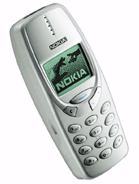Future of new communication technologies (going global and mobile)
New media are basically extensions of old media and therefore, we will be able to notice the difference between the cell phones of today and tommorow. It would have undergone a revamp and turn out to be revised, replaced or reinvented.
-By Kent German, CNET.comJun 10, 2008-
Almost one year after the original Apple iPhone went on sale in the US, Apple CEO Steve Jobs has announced a 3G version of the device, finally putting to rest months of rumors and speculation. While some of the rumors panned out, other rumors, like the addition of a 32GB model, fizzled. The addition of 3G support is a big win. If data speeds hold up as Jobs demonstrated, the new iPhone really will put the Internet in your pocket. The new iPhone will go on sale July 11 in selected countries including the US, Japan, Hong Kong and Australia.

Some data for Nokia 3310 model:
GPRS- No
HSCSD- No
EDGE- No
3G- No
WLAN- No
Bluetooth- No
Infrared port- No
USB- No
GPRS- No
HSCSD- No
EDGE- No
3G- No
WLAN- No
Bluetooth- No
Infrared port- No
USB- No

The difference between these two mobile phones are really distinct. These days, one usually at least have a basic handphone with infrared-red or bluetooth to send pictures,photographs and music. Most people can afford to purchase a phone with 3G technology too.
Nowadays, it is easy and quick to communicate with others,look up information,make appointments through new medias like mobile phones,computers,blogs,informative websites,Youtube and many more.
Many outcomes,negative and positive can be derived from the arrival of these new and improved media technologies. Some of which are access to more information, faster speed to get them, invasion of privacy, greater dependence due to these new and complex mediums available for usuage, information overload, credibility.